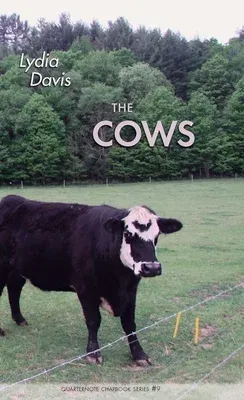"You read Lydia Davis to watch a writer patiently divide the space
between epiphany and actual human beings by first halves, then quarters,
then eighths, and then sixteenths, into infinity," says The Village
Voice. Indeed, Lydia Davis is mathematician, philosopher, sculptor,
jeweler, and scholar of the minute. Few writers map the process of
thought as well as she, few perceive with such charged intelligence.
The Cows is a close study of the three much-loved cows that live
across the road from her. The piece, written with understated humor and
empathy, is a series of detailed observations of the cows on different
days and in different positions, moods, and times of the day. It could
be compared to some sections of Wallace Stevens' "Thirteen Ways of
Looking at a Blackbird" or to Claude Monet's paintings of Rouen
Cathedral.
Forms of play: head butting; mounting, either at the back or at the
front; trotting away by yourself; trotting together; going off bucking
and prancing by yourself; resting your head and chest on the ground
until they notice and trot toward you; circling each other; taking the
position for head-butting and then not doing it.
She moos toward the wooded hills behind her, and the sound comes back.
She moos in a high falsetto before the note descends abruptly, or she
moos in a falsetto that does not descend. It is a very small sound to
come from such a large, dark animal.

